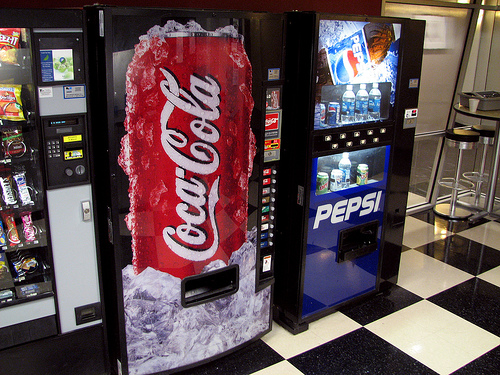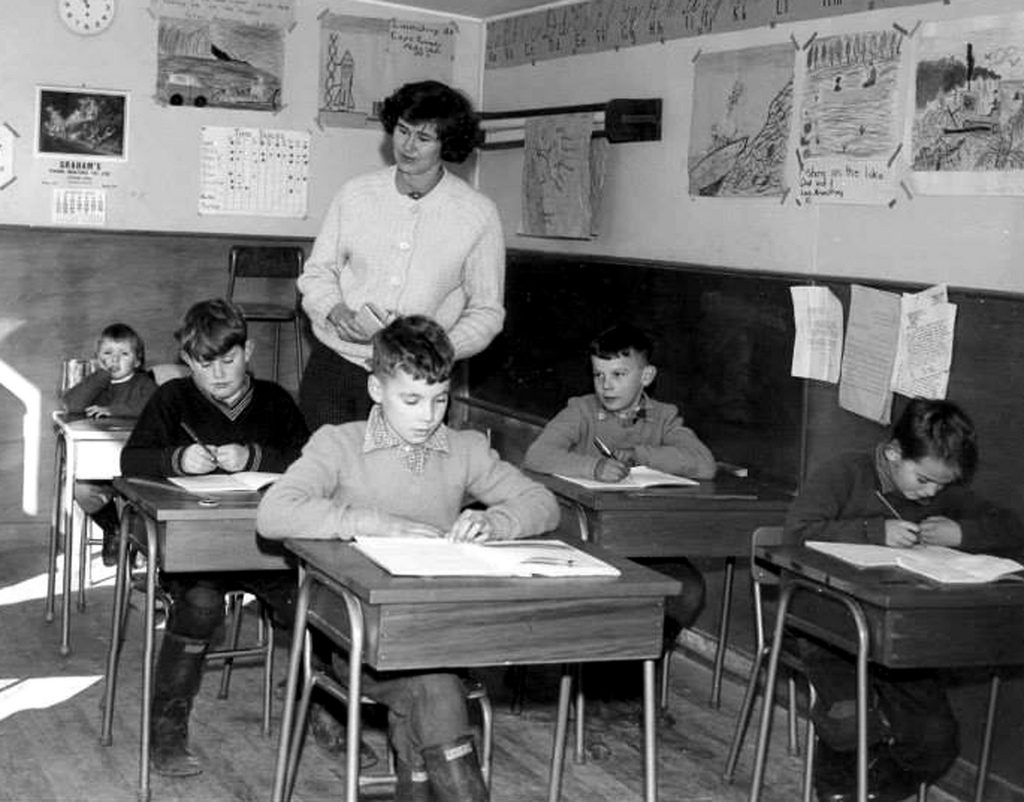We live in a consumerist society. We see something shiny advertised on a billboard and we are sold. We like to be the best by having the top brands and we stay loyal to the brands we like. At least I do. I can honestly name 10 companies I always buy products from in the matter of a minute. Crazy? Maybe. This week in our EDTC 400 class, our debate focused on the topic if whether or not “Public education has sold its soul to corporate interests”.On the agreement side was Liz and on the disagreement side was Shaleen. This was an interesting debate to say the least as we talked a LOT about the University of Regina’s million-dollar sign but we did explore ideas beyond the sign.
Agree
Liz started the debate by hitting us with cold hard facts. Some of these facts included companies like Pearson (a textbook company) creating standardized testing in the schools to coincide with THEIR textbooks… Other ideas included in Liz’s video and our class debate were:
- Textbook companies
- The companies are instructing teachers what to learn and some companies favour regions which by the most textbooks
- For instance, Liz took a class where the company sold the majority of textbooks to Texas so as a French immersion student, she was upset when there was a Spanish translation instead of a French translation
- What does Pearson offer? Check this out!
- The companies are instructing teachers what to learn and some companies favour regions which by the most textbooks
- Pepsi and Coke drink machines
- Kids are getting hooked on these drinks since they are easily accessible
- I don’t think I need to explain to anyone why pop isn’t healthy, it’s kind of common knowledge but here’s some facts anyways.
- Schools spend money from cooperation’s foolishly
- Ex: University of Regina sign
- Creating lifetime consumers
- Students will buy what they are familiar with
- Ex: If students use Chromebooks all throughout their education, they may be afraid to use a PC so they will buy a Chromebook since they are familiar with it.

“The Inside Story of How Bill Gates Bought the Common Core” further emphasizes how corporations have taken over schools. Bill Gates was asked by two gentlemen about him to create education standards, known as the Common Core standards. Schools did not even conduct trials on these standards, they just went along with it. Crazy? As the article goes on to say Gates did something no one else had done it concludes by leaving readers with one comment; “never has one man had the wealth, the political connections, and the grand ambition to buy American education. But Bill Gates did it,”.
Switching gears from standardization to Pepsi and Coke. Did your school have pop machines? Mine did, but they were not allowed to put pop into the machines, instead our machines were filled with Gatorade, juice and water. But no one bought juice and water, it was all Gatorade. In an article written by Tom Philpott, titled “80 Percent of Public Schools Have Contracts With Coke or Pepsi”, we are able to learn more about corporations entering the hallways of our schools. School are using these drink machines in a term called “pouring rights contracts” which means schools are allowing companies like Pepsi and Coca-Cola into their schools in drink machines and advertising their companies. We had multiple students point out they had scoreboards with the Pepsi logo clearly visible on it. Is this good? No, companies like Pepsi have products which are high in sugars and who knows what else is bad in which are affecting student’s weight. In fact, students are more obese more than ever in this day and age as Philpott found “according to the Robert Wood Johnson Foundation, obesity rates among children ages 6 to 11 have quadrupled over the past four decades, and nearly a third of children and adolescents-more than 23 million kids and teenagers-are obese or overweight,”. Concerning, right? Let’s explore what Shaleen had to say about this.

Disagree
Shaleen did not back down from this fight. She brought up points such as schools buy what they can afford and other strong arguments with ideas coming my other EDTC 400 classmates including ideas such as:
- Schools buy what they can afford
- Do teachers have a voice for what is bought for their classroom?
- Do administrators at the schools acknowledge teachers’ needs and requests?
- We live in a capitalist society
- Our government is not providing enough money for schools so companies are filling in the void to get teachers and students what they need.
“Ask the expert: smartly investing in education technology” written by Matthew Lynch explores the rise and need for technology in the classroom. If you have taken any education classes, you will quickly learn technology is a pretty handy tool in the classroom, and this article justifies that. The problem though? Schools are not able to keep up to the rising cost of technologies. The solution? If schools are not given a large enough budget to cover the needs of technology, corporations are stepping in. Lynch provides examples by writing, “A number of companies and foundations regularly donate to schools, for example the Bill and Melinda Gates Foundation,”.
Aside from the cost of technology, schools are also using corporate companies for good. Schools are using Google Drive, Edmodo, Twitter and other corporations for education. Look at the University of Regina, UR courses is a Google product and we use it EVERY DAY.

The Verdict
In this debate, we also talked about how some schools have field trips sponsored by companies like Boston Pizza. Even though this is a corporate company, isn’t going to BP’s with your classmates the most exciting field trip ever when you’re young? It’s debateable, some schools may not be able to go on field trips but is going to BP’s to eat pizza really an educational school trip? Does it sound more like a birthday party? Another question brought up from this debate is, how are schools using the funding? Reference the U of R sign, again. And lastly, are rural schools funded by corporations as much as city schools? I know at my old high school, we did not have scoreboards with the Pepsi logo, our new football booth, is not corporate funded unless you call local businesses donating the supplies and the grade 12 construction class doing the labour, a corporation. In the end, I do not know exactly where I stand with this debate. In one way, I see concerns about textbook companies like Pearson’s favouring their top buyers by putting information more relevant to that area as compared to another area which does not buy textbooks as often or in as large amounts. That scares me. So does the health risks with pop machines, but if a high school student is buying Pepsi every day, should they not know better by this age? Would this topic not be covered in health? What’s the difference if a student buys the Pepsi in their school hallways or at the convenient store at the corner of the street? The problem isn’t about where the Pepsi came from, but the student not knowing the health effects of this. On the other hand, schools may not be able to afford ‘stuff’ for their students without extra money from external sources. If students do not have this extra ‘stuff’ or even necessary ‘stuff’, their education is being affected. In the end, I did vote for the agreement side for schools selling their souls to corporations. But in reality, I think it all comes down to BALANCE.

Hey Jayden,
You raised some really great questions throughout your post here, many of which we discussed during the debate and others that really expand beyond those discussions! I think that there are so many different elements to be taken into consideration when evaluating just how much power corporations have when they partner up with schools! Ideally, we would not need to have to partner up with sponsors if we received the proper funding, but this often is just isn’t the case! Ultimately, I agree with you that it’s all about balance! Great post!
Lauren
Thank you for reading my post! I agree corporations are stepping into schools simply to fill gaps in which funding is not provided. I think as we let corporations into our schools we should be aware of what is happened, like is it truly necessary for Pepsi to be sold in the schools? I think not but it is up to admin to make that decision
Thank you for reading my post! I agree with you – it does come down to proper funding but we have to rely on outsiders – we just need to be cautious of what the corporations are promoting or sending a message of
Hi Jayden, great work summarizing another debate and having a catchy title and introduction as always. I like that your confidently able to admit that you are not sure where you stand with the topic under discussion. There are great arguments for both sides and as you said, BALANCE is key. I think the purpose of these debates is to open our eyes to both sides of the argument and new perspectives and you can tell this debate got your wheels turning and encouraged critical thought. Good luck finishing off your semester!
Good luck to you in this busy time in the semester! After many debates, I think the keyword I’ve learnt is literally everything needs balance. Balance will not persuade us to either side or create us to favour one side over the other which I think will be most beneficial for our students.